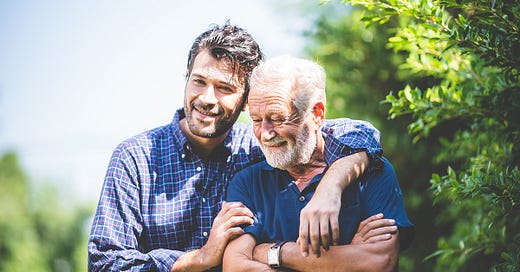Why This Father's Day, We Must Reclaim and Celebrate Masculinity
And we must lecture society to STOP beating on men
In recent years, there has been a growing cultural tendency to frame certain aspects of male identity in a relentlessly negative light. Terms like “toxic masculinity” and “mansplaining” are used so broadly, and so often, that they have started to cast a shadow over masculinity itself — as though being a man, embracing masculine traits, or fulfilling traditionally male roles is inherently problematic. It is not. Masculinity is not toxic. And painting it as such does a disservice not only to men, but to society as a whole.
This trend has consequences that reach far beyond adult discourse — it seeps into how we raise boys, how we treat men, and how we value fathers. When boys grow up hearing that their instincts to lead, protect, compete, or stand tall are signs of something shameful, we are not teaching humility — we are sowing confusion and doubt. We are telling them that their very identity, unless reshaped or softened, is unwelcome. And when men are met more often with skepticism than appreciation, when they’re told that their words are suspect and their intentions presumed to be self-serving, we are eroding the foundation of mutual respect that healthy communities and families require.
Fatherhood, in particular, suffers under this cultural shift. For all our progress in recognizing the importance of emotional intelligence and shared parenting, there is a quiet but dangerous undermining of the unique role that fathers play. Being a father is not just about being another adult in the home. It's about modeling strength with restraint, protection without domination, discipline with love. It is about showing what healthy masculinity looks like — not perfect, not domineering, not cold or detached, but present, grounded, and strong.
We must also recognize that both men and women carry a spectrum of traits that can be described as masculine or feminine — and that this isn’t a problem to be fixed, it’s the natural order of things. Strength, assertiveness, nurturing, vulnerability — these aren’t owned by one gender. They appear, in different degrees, in everyone. Nature allows for this range; it’s biology, not ideology. What’s unnatural is the current impulse to “correct” people — to flatten their personalities, to demand that women toughen up and men soften down in a way that denies individual expression and suppresses healthy instinct. We are not all meant to be the same, and we shouldn’t be forced into emotional or behavioral conformity to satisfy cultural preferences. When we attempt to erase masculine or feminine energy in the name of progress, we are not evolving — we are distorting.
The contributions of fathers are not interchangeable with those of mothers. They are complementary. A child — whether a boy or a girl — benefits deeply from seeing both the masculine and feminine in action. Girls learn what to expect from men in the future as boys learn what to expect from women in the future from their mothers. Boys learn who they can become and how they become, men. When we celebrate fathers, we are not diminishing mothers — we are honoring the balance that builds resilient children and well-rounded adults.
For older generations of men, the modern framing of masculinity as inherently “toxic” is not just confusing — it’s deeply disheartening. Many of these men spent their lives working hard, raising families, and fulfilling the roles expected of them as providers, protectors, and fathers. To now be told, implicitly or explicitly, that the very traits they leaned on — strength, stoicism, decisiveness — were harmful all along is more than unfair; it’s demoralizing. It rewrites their legacy in a way that suggests their contributions were misguided or even damaging, and it alienates them from the cultural conversations about progress and equity. This isn’t how we build a better society — by casting generations of men as villains in retrospect. Improvement and growth are important, yes, but painting millions of fathers and grandfathers with a broad brush of blame doesn't foster healing or unity. It breeds resentment, guilt, and shame — and sends a dangerous message that no matter how much good a man has done, he may still be labeled as part of the problem simply for being who he is.
To uplift men is not to excuse bad behavior, nor is it to deny the importance of holding individuals accountable for harm. But critique loses meaning when it stops being specific and starts becoming a sweeping indictment of an entire gender. We must stop conflating masculinity with abuse, with arrogance, with harm. Masculinity, like femininity, has its strengths, its flaws, its shades — but it is not a threat. When embraced in its healthy, honest form, masculinity nurtures, protects, and builds.
This Father’s Day, let us remember what it means to honor our fathers and the men in our lives who have shaped us — not by stripping them of what makes them men, but by embracing those qualities that are uniquely theirs. Let us raise our sons to be proud of who they are and teach our daughters to see strength in men not as something to fear, but something to respect and value. This does not take anything from women or harm women, and we must stop pretending it does.
We need men. We need fathers. We need their presence, their love, their protection, and their guidance. Not diminished, not silenced, not redefined — but celebrated for who they truly are.
Happy Father’s Day to all the Dads out there.








Excellent article!
Much needed voice these days!